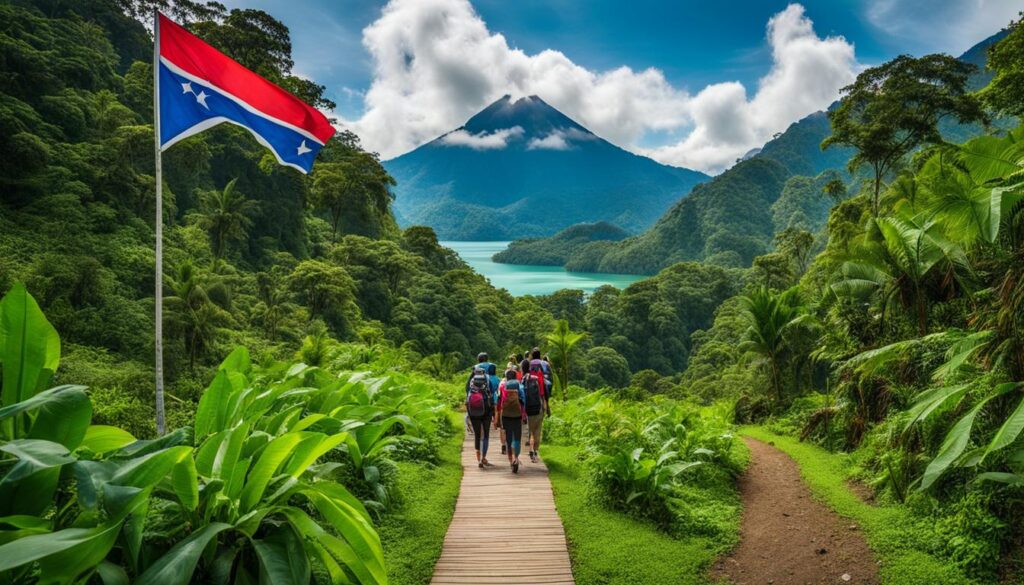At the forefront of property financing in Costa Rica, GapInvestments.com stands as a beacon for…

Essential Steps after Gaining Costa Rica Citizenship: A Guide
Obtaining Costa Rican citizenship is an important milestone that offers numerous benefits and opportunities. However, it requires meeting specific eligibility criteria and going through a step-by-step process. In this guide, we will provide you with essential information on the steps to take after gaining Costa Rica citizenship, the benefits and rights that come with it, and the requirements to become a citizen of Costa Rica.
Key Takeaways:
- After gaining Costa Rica citizenship, individuals can enjoy benefits such as access to healthcare, education opportunities, and employment rights.
- Costa Rican citizens have visa-free travel to over 150 countries and can participate in local and national elections.
- To become a citizen of Costa Rica, applicants must meet eligibility criteria, including residency and language requirements.
- The naturalization process involves submitting an application, completing an interview, and taking an oath of allegiance.
- Obtaining Costa Rican citizenship requires patience as the process can take several months to complete.
Costa Rica Citizenship Requirements
To become a citizen of Costa Rica, individuals must fulfill specific requirements. These requirements include being at least 18 years old, having resided in Costa Rica for at least five years as a permanent resident, not having any criminal convictions, being able to speak Spanish at an intermediate level, and demonstrating proof of sufficient income or financial stability.
In addition to these general requirements, applicants will need to provide various documents to support their application. These documents include a valid passport, certified copy of their birth certificate, police clearance certificate, residency permits, and evidence of income or financial stability. It’s important to note that the specific documents required may vary depending on individual circumstances.
The Costa Rica citizenship application timeline can vary, as the naturalization process can take several months. The timeline is influenced by factors such as the efficiency of document processing, the number of applications in the queue, and the availability of interview appointments. It is recommended to begin the application process well in advance to allow for any potential delays.
Costa Rica Citizenship Requirements:
| Requirement | Description |
|---|---|
| Age | Applicants must be at least 18 years old. |
| Residency | Applicants must have resided in Costa Rica for at least five years as a permanent resident. |
| Criminal Record | Applicants must not have any criminal convictions. |
| Language | Applicants must be able to speak Spanish at an intermediate level. |
| Income or Financial Stability | Applicants must demonstrate proof of sufficient income or financial stability. |
By meeting the eligibility criteria and completing the necessary documentation, individuals can navigate the citizenship application process to become citizens of Costa Rica.

Understanding the Costa Rican Citizenship Process
Obtaining Costa Rican citizenship is a multi-step process that requires meeting specific eligibility criteria and following a series of procedures. This section will guide you through the naturalization process and highlight the privileges that come with being a citizen of Costa Rica.
Eligibility and Application
To start the naturalization process, applicants must submit an application to the Costa Rican Department of Immigration. Along with the application, individuals need to provide all required supporting documents and pay the necessary fees. These documents may include a valid passport, certified copy of birth certificate, police clearance certificate, residency permits, and proof of income or financial stability.

Interview and Oath of Allegiance
Once the application is received, it will be reviewed and evaluated by the immigration authorities. If approved, applicants will be scheduled for an interview with a consular officer. During the interview, individuals will be asked questions about their background, reasons for seeking citizenship, and their knowledge of Costa Rican culture and history. It’s important to prepare for this interview by studying the country’s history, culture, and current affairs.
If the interview is successful, applicants will then need to take an oath of allegiance to the Republic of Costa Rica. This oath signifies their commitment to the country and its values. Once the oath is taken, individuals officially become citizens of Costa Rica and can enjoy the privileges that come with it.
Citizenship Privileges
As citizens of Costa Rica, individuals gain access to various privileges and benefits. These include healthcare services, education opportunities, employment rights, and the ability to participate in local and national elections. Additionally, Costa Rican citizens enjoy visa-free travel to over 150 countries, making it easier for them to explore the world.
In summary, the process of obtaining Costa Rican citizenship involves submitting an application, undergoing an interview, and taking an oath of allegiance. By fulfilling these requirements, individuals can become citizens of Costa Rica and enjoy the numerous privileges that come with it.
Conclusion
Obtaining Costa Rican citizenship is a significant milestone that opens up a world of opportunities. After gaining citizenship, individuals can take advantage of the numerous benefits that come with being a citizen of Costa Rica.
One of the key advantages is access to healthcare services. As citizens, individuals have the right to quality healthcare, ensuring their well-being and peace of mind. Additionally, Costa Rican citizens also have access to a robust education system, providing them with opportunities for personal and professional growth.
Furthermore, citizenship grants individuals various rights. Costa Rican citizens enjoy the privilege of visa-free travel to over 150 countries, making it easier to explore the world. They also have the right to participate in local and national elections, allowing them to have a say in the democratic processes of the country.
While the process of obtaining citizenship requires meeting specific eligibility criteria and going through the naturalization process, the benefits are worth the effort. By following the necessary steps after gaining Costa Rica citizenship, individuals can fully embrace the rights and privileges that come with being a citizen of this beautiful country.
FAQ
What are the eligibility criteria to obtain Costa Rican citizenship?
To become a citizen of Costa Rica, applicants must be at least 18 years old, have resided in Costa Rica for at least five years as a permanent resident, have no criminal convictions, be able to speak Spanish at an intermediate level, and show proof of sufficient income or financial stability.
What documents are required to apply for Costa Rican citizenship?
Applicants will need to provide documents such as a valid passport, certified copy of their birth certificate, police clearance certificate, residency permits, and proof of income or financial stability. Additional documents may be required depending on individual circumstances.
What is the process of obtaining Costa Rican citizenship?
The process involves submitting an application to the Costa Rican Department of Immigration, completing an interview with a consular officer, and taking an oath of allegiance to the Republic of Costa Rica. It’s important to note that the naturalization process can take several months to complete.
What are the benefits of becoming a citizen of Costa Rica?
As a citizen of Costa Rica, individuals have access to healthcare services, education opportunities, employment rights, visa-free travel to over 150 countries, and the ability to participate in local and national elections.
How long does it take to obtain Costa Rican citizenship?
The naturalization process can take several months to complete. The exact timeline may vary depending on individual circumstances and the workload of the Costa Rican Department of Immigration.


